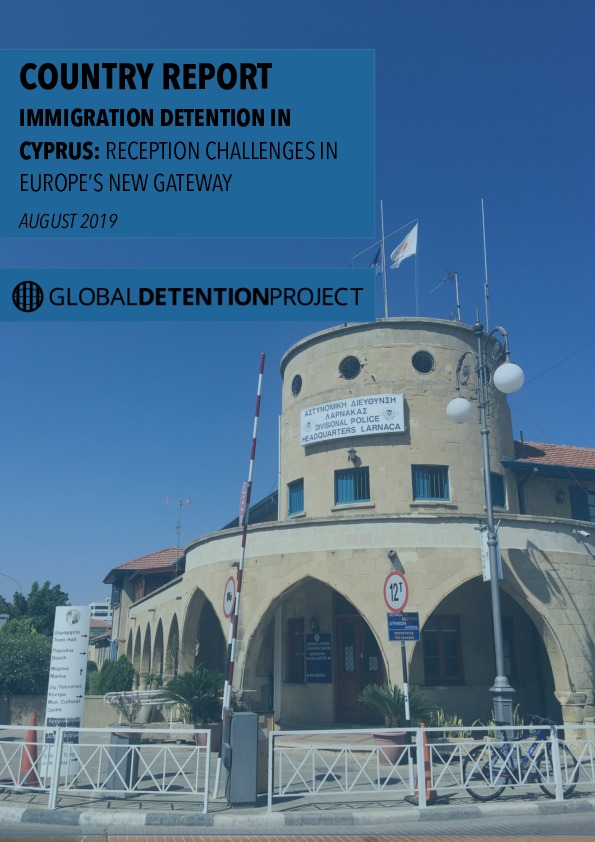Immigration Detention in Greece (2019 Report): A critical entry point for migrants, refugees, and asylum seekers into the EU, Greece has been a key focus in Europe’s efforts to halt refugee flows. Since the EU-Turkey agreement in 2016, a policy of geographical restriction has left large numbers of people stranded on the Aegean islands for […]
Publications & Events
Submission to the European Committee for the Prevention of Torture (CPT): Ireland
Ireland: Issues Related to Immigration Detention Submission to the European Committee for the Prevention of Torture and Inhuman or Degrading Treatment or Punishment (CPT) in Preparation for its Visit to Ireland The Global Detention Project (GDP) is an independent research centre based in Geneva, Switzerland, that investigates the use of detention as a response to […]

Joint Submission to the Working Group on Arbitrary Detention: Qatar
Qatar: Issues Related to Immigration Detention Joint Submission with Migrant-Rights.org to the Working Group on Arbitrary Detention in Preparation for its Mission to Qatar on 3-14 November 2019 The Global Detention Project (GDP) and Migrant-Rights.org are pleased to provide the Working Group on Arbitrary Detention (WGAD) this joint submission in preparation for the WGAD’s visit […]

Internazionale a Ferrara: Debate on Immigration Detention
“Internazionale a Ferrara” – Ferrara, Italy Saturday 5 October – 11:00 – Teatro Comunale On 5 October, the GDP’s Executive Director Michael Flynn will participate in a public debate organised by Medecins Sans Frontières (MSF) concerning immigration detention policies around the world. The debate, “The World Behind Bars,” is part of the Italian news weekly Internazionale’s […]

Au Revoir Mariette Grange!
At the end of June, Mariette Grange, the GDP’s long-time advisor and senior researcher, retired after a distinguished decades-long career as a Geneva-based human rights advocate specialising in the rights of migrants and refugees. Mariette has been a part of the GDP team since its inception: first as an advisor to and then member of […]

NEWSLETTER: July/August 2019
OUR LATEST PUBLICATIONS Immigration Detention in Cyprus: Reception Challenges in Europe’s New Gateway Although the Republic of Cyprus is one of only a small number of EU member states that have yet to join the Schengen visa-free zone, the country is quickly becoming an important gateway for migrants and refugees as other routes into the EU […]

Meetings with the Committee on Migrant Workers
On 2-11 September the UN Committee on Migrant Workers will hold its 31st session in Geneva, during which it will consider reports on Argentina, Colombia, and Bosnia and Herzegovina. The GDP will participate in a CMW-organised meeting with NGOs and civil society on 2 September and the meeting with governments on 4 September. More information […]

The Contours of Crimmigration Control in India – Global Detention Project Working Paper No. 25
While the concepts of “crimmigration” and “immcarceration” have received much scrutiny in the Global North, far less attention has been given to them in the context of South-South migration. This working paper helps address this gap by identifying distinctive aspects of crimmigration control in India and its connections with the governance of migration in wealthier countries. […]

NEWSLETTER: The Contours of Crimmigration Control in India
The criminalisation of irregular migration through escalated enforcement of toughened immigration laws is often referred to as crimmigration or immcarceration. Detention and deportation are important aspects of such enforcement across the globe. While these processes have received much scrutiny in the Global North, far less attention has been given to them in the context of South-South migration. This […]

Cyprus: Reception Challenges in Europe’s New Gateway
Immigration Detention in Cyprus (2019 Report): Although the Republic of Cyprus is one of only a small number of EU member states that have yet to join the Schengen visa-free zone, the country is quickly becoming an important gateway for migrants and refugees as other routes into the EU have been blocked. With a small […]




